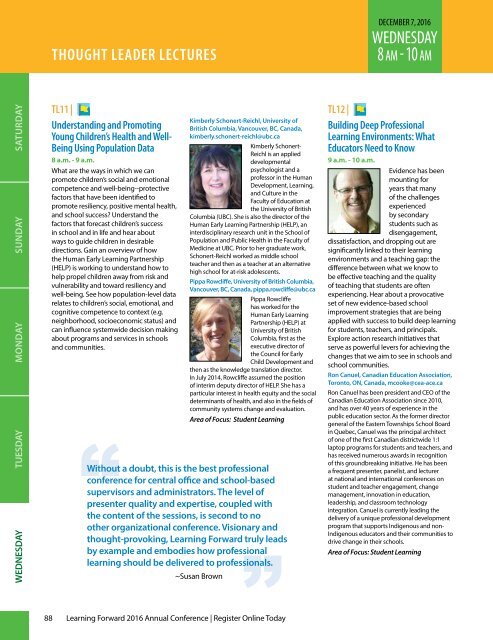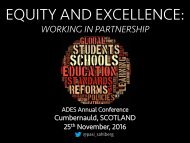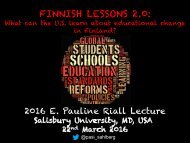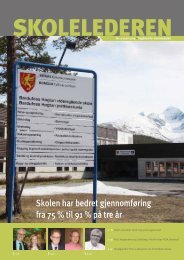learning-forward-2016-annual-conference-program
learning-forward-2016-annual-conference-program
learning-forward-2016-annual-conference-program
You also want an ePaper? Increase the reach of your titles
YUMPU automatically turns print PDFs into web optimized ePapers that Google loves.
THOUGHT LEADER LECTURES<br />
DECEMBER 7, <strong>2016</strong><br />
WEDNESDAY<br />
8 AM - 10 AM<br />
WEDNESDAY TUESDAY<br />
MONDAY<br />
SUNDAY<br />
SATURDAY<br />
TL11 |<br />
Understanding and Promoting<br />
Young Children’s Health and Well-<br />
Being Using Population Data<br />
8 a.m. - 9 a.m.<br />
What are the ways in which we can<br />
promote children’s social and emotional<br />
competence and well-being--protective<br />
factors that have been identified to<br />
promote resiliency, positive mental health,<br />
and school success? Understand the<br />
factors that forecast children’s success<br />
in school and in life and hear about<br />
ways to guide children in desirable<br />
directions. Gain an overview of how<br />
the Human Early Learning Partnership<br />
(HELP) is working to understand how to<br />
help propel children away from risk and<br />
vulnerability and toward resiliency and<br />
well-being. See how population-level data<br />
relates to children’s social, emotional, and<br />
cognitive competence to context (e.g.<br />
neighborhood, socioeconomic status) and<br />
can influence systemwide decision making<br />
about <strong>program</strong>s and services in schools<br />
and communities.<br />
Kimberly Schonert-Reichl, University of<br />
British Columbia, Vancouver, BC, Canada,<br />
kimberly.schonert-reichl@ubc.ca<br />
Kimberly Schonert-<br />
Reichl is an applied<br />
developmental<br />
psychologist and a<br />
professor in the Human<br />
Development, Learning,<br />
and Culture in the<br />
Faculty of Education at<br />
the University of British<br />
Columbia (UBC). She is also the director of the<br />
Human Early Learning Partnership (HELP), an<br />
interdisciplinary research unit in the School of<br />
Population and Public Health in the Faculty of<br />
Medicine at UBC. Prior to her graduate work,<br />
Schonert-Reichl worked as middle school<br />
teacher and then as a teacher at an alternative<br />
high school for at-risk adolescents.<br />
Pippa Rowcliffe, University of British Columbia,<br />
Vancouver, BC, Canada, pippa.rowcliffe@ubc.ca<br />
Pippa Rowcliffe<br />
has worked for the<br />
Human Early Learning<br />
Partnership (HELP) at<br />
University of British<br />
Columbia, first as the<br />
executive director of<br />
the Council for Early<br />
Child Development and<br />
then as the knowledge translation director.<br />
In July 2014, Rowcliffe assumed the position<br />
of interim deputy director of HELP. She has a<br />
particular interest in health equity and the social<br />
determinants of health, and also in the fields of<br />
community systems change and evaluation.<br />
Area of Focus: Student Learning<br />
“<br />
Without a doubt, this is the best professional<br />
<strong>conference</strong> for central office and school-based<br />
supervisors and administrators. The level of<br />
presenter quality and expertise, coupled with<br />
the content of the sessions, is second to no<br />
other organizational <strong>conference</strong>. Visionary and<br />
thought-provoking, Learning Forward truly leads<br />
by example and embodies how professional<br />
”<br />
<strong>learning</strong> should be delivered to professionals.<br />
~Susan Brown<br />
88 Learning Forward <strong>2016</strong> Annual Conference | Register Online Today<br />
TL12 |<br />
Building Deep Professional<br />
Learning Environments: What<br />
Educators Need to Know<br />
9 a.m. - 10 a.m.<br />
Evidence has been<br />
mounting for<br />
years that many<br />
of the challenges<br />
experienced<br />
by secondary<br />
students such as<br />
disengagement,<br />
dissatisfaction, and dropping out are<br />
significantly linked to their <strong>learning</strong><br />
environments and a teaching gap: the<br />
difference between what we know to<br />
be effective teaching and the quality<br />
of teaching that students are often<br />
experiencing. Hear about a provocative<br />
set of new evidence-based school<br />
improvement strategies that are being<br />
applied with success to build deep <strong>learning</strong><br />
for students, teachers, and principals.<br />
Explore action research initiatives that<br />
serve as powerful levers for achieving the<br />
changes that we aim to see in schools and<br />
school communities.<br />
Ron Canuel, Canadian Education Association,<br />
Toronto, ON, Canada, mcooke@cea-ace.ca<br />
Ron Canuel has been president and CEO of the<br />
Canadian Education Association since 2010,<br />
and has over 40 years of experience in the<br />
public education sector. As the former director<br />
general of the Eastern Townships School Board<br />
in Quebec, Canuel was the principal architect<br />
of one of the first Canadian districtwide 1:1<br />
laptop <strong>program</strong>s for students and teachers, and<br />
has received numerous awards in recognition<br />
of this groundbreaking initiative. He has been<br />
a frequent presenter, panelist, and lecturer<br />
at national and international <strong>conference</strong>s on<br />
student and teacher engagement, change<br />
management, innovation in education,<br />
leadership, and classroom technology<br />
integration. Canuel is currently leading the<br />
delivery of a unique professional development<br />
<strong>program</strong> that supports Indigenous and non-<br />
Indigenous educators and their communities to<br />
drive change in their schools.<br />
Area of Focus: Student Learning







